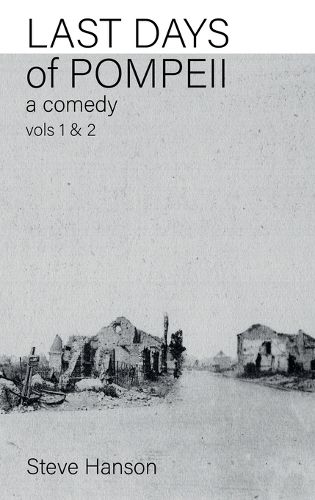Readings Newsletter
Become a Readings Member to make your shopping experience even easier.
Sign in or sign up for free!
You’re not far away from qualifying for FREE standard shipping within Australia
You’ve qualified for FREE standard shipping within Australia
The cart is loading…






This title is printed to order. This book may have been self-published. If so, we cannot guarantee the quality of the content. In the main most books will have gone through the editing process however some may not. We therefore suggest that you be aware of this before ordering this book. If in doubt check either the author or publisher’s details as we are unable to accept any returns unless they are faulty. Please contact us if you have any questions.
Last Days of Pompeii presents an hourly-paid lecturer trying to write fiction. His fictions process his past via nightmares of previous lives in northern small towns, where the endless cycles of rebirth and changeless vistas are one kind of hell, not an idyll to be romanticised. His fictions then begin to sweat the augurs of a rapidly oncoming brutal future, the new hell, via an attempt to write the sci-fi he loves. The present and future begin to blur, his mental health starts to crumble. But his fiction fails - it fails in quality - his work frequently fails, his colleagues fail, the students fail, the university fails, the city fails, our culture fails. The world fails. In an era when to be 'professional' is to fake it until you make it, then carry on faking it after you've made it - as the solipsistic populations of the west and beyond stroll towards the precipice - Last Days of Pompeii declares the new revanchist frontier for literature in our time to be the Literature of Failure. But this can be no grand announcement. This new literature must not be the prurient, sentimental peddling of individual struggle already on the market, but an unflinching, excoriating smash of personal with historical failure. Our hugely excessive language of positivity is a thin veneer, it reflects our narcissism back at us, but masks the inevitable era of collapse to come. The biggest tragedy of all is that tragedy gains no traction in these risible last days. Perhaps it never does, at the end of any civilisation. Maybe tragedy is always retrospectively sketched in. Last Days of Pompeii exemplifies this inversion: first as farce and only then, falsely, as tragedy.
$9.00 standard shipping within Australia
FREE standard shipping within Australia for orders over $100.00
Express & International shipping calculated at checkout
This title is printed to order. This book may have been self-published. If so, we cannot guarantee the quality of the content. In the main most books will have gone through the editing process however some may not. We therefore suggest that you be aware of this before ordering this book. If in doubt check either the author or publisher’s details as we are unable to accept any returns unless they are faulty. Please contact us if you have any questions.
Last Days of Pompeii presents an hourly-paid lecturer trying to write fiction. His fictions process his past via nightmares of previous lives in northern small towns, where the endless cycles of rebirth and changeless vistas are one kind of hell, not an idyll to be romanticised. His fictions then begin to sweat the augurs of a rapidly oncoming brutal future, the new hell, via an attempt to write the sci-fi he loves. The present and future begin to blur, his mental health starts to crumble. But his fiction fails - it fails in quality - his work frequently fails, his colleagues fail, the students fail, the university fails, the city fails, our culture fails. The world fails. In an era when to be 'professional' is to fake it until you make it, then carry on faking it after you've made it - as the solipsistic populations of the west and beyond stroll towards the precipice - Last Days of Pompeii declares the new revanchist frontier for literature in our time to be the Literature of Failure. But this can be no grand announcement. This new literature must not be the prurient, sentimental peddling of individual struggle already on the market, but an unflinching, excoriating smash of personal with historical failure. Our hugely excessive language of positivity is a thin veneer, it reflects our narcissism back at us, but masks the inevitable era of collapse to come. The biggest tragedy of all is that tragedy gains no traction in these risible last days. Perhaps it never does, at the end of any civilisation. Maybe tragedy is always retrospectively sketched in. Last Days of Pompeii exemplifies this inversion: first as farce and only then, falsely, as tragedy.